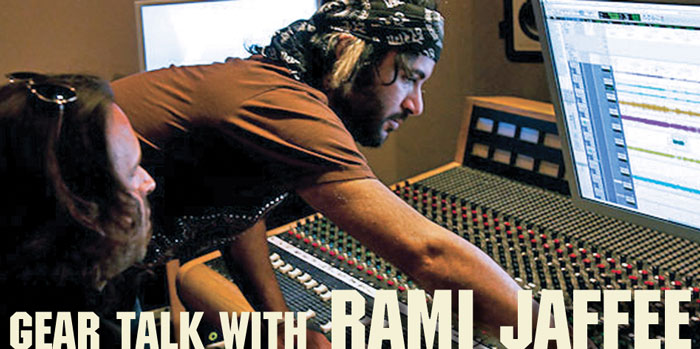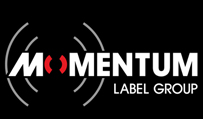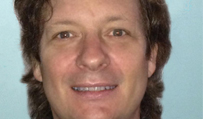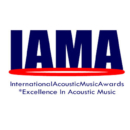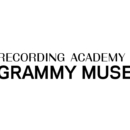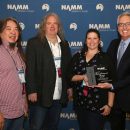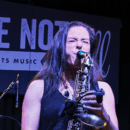By Kurt Orzeck
Like gear at a concert, Rami Jaffee––one of rock’s go-to keyboard sideman––can often fly under the radar. But his contributions are as numerous as they are impressive. Jaffee playing the Hammond B3 organ on the Wallflowers’ self-titled debut in 1992, regularly records and tours with Foo Fighters, and has also lent his talents to Pearl Jam, Pete Yorn, Soul Asylum, Stone Sour, Joseph Arthur and Coheed and Cambria.
To boot, the keyboardist co-owns Fonogenic Studios––a recording studio and performance space in Van Nuys, CA––with musician Ran Pink.
With more than 30 years of experience tickling the keys in both studio and live formats, Jaffee spilled about his favorite pieces of gear and imparted some gear-rental advice for budding indie artists.
• What types of gear and backline equipment would you recommend renting or buying for up-and-coming artists who don’t have a lot of money to spare or are looking for the most convenient options?
Great question!!! I’ve mentioned new keyboards that kinda rock and even new pro audio gear by boutique companies, BUT these pieces are definitely not cheap! There’s so much cool stuff that is very reasonable in price and amazing sounding like Audio-Technica microphones (I’ve been using mine for two decades on drums and keys and vocals ... super affordable and badass), the Microkorg is not even $500 and it smokes fat ass synth sounds like its elders. Apogee makes super affordable recorders like the duet or the one and it sounds incredible. I mean, press-the-soft-limit-and-turn-that-shit-up incredible!
• What specific pieces of gear and backline equipment––for both touring and recording––do you use for each music project for which you perform?
That’s a wide wall of keyboards we’re talking about, but you will almost always see a Hammond B3 organ and a Leslie speaker hanging around. That’s become my favorite toy, but touring with the new Mellotron M4000D has been a highlight out with the Foos.
In the studio, I’m open to all things that make people smile ... everything from an old Marxophone to a Stylophone I bought from Urban Outfitters, but mostly organs and pianos of various vintage. Lately, I’ve popped out so much playing with random side projects (After School Special, Jonny Kaplan & the Lazy Stars, etc.), and I’ll pop a Nord Electro into a Quilter amp and make some great noises.
• Which pieces do you rent and which do you own? Why do you choose one or the other?
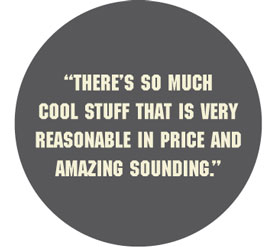 I own most everything I play, but if I have a session at Henson Recording Studios and their Hammond is fired up, I’m game to play it.
I own most everything I play, but if I have a session at Henson Recording Studios and their Hammond is fired up, I’m game to play it.
• Can you talk a bit about why you favor each of those pieces––what they bring to your sound, what practical advantages they have, etc.?
I favor classic instruments mainly in their purer forms. I feel that with older gear I get a certain “help” from their imperfections that people really seem to connect with. But just the same, if I have some new gadget Guitar Center Nord-type thing, I can manipulate it using my memory of the vintage sound of the real deals. Just have to use your ears and have a damn good imagination.
• Which pieces have you used throughout your career and which are new additions? Why have you held on to some and brought in others?
The Hammond B3 organ launched my career and will never go away. It always teaches me things that inspire me to play every day. This doesn’t close me off of trying new keyboards, especially with amazing boards out all the time, like the Microkorg, the whole line of Moog and even new Oberheim stuff. I’ve even been messing around with the new Buchla stuff. Fun.
• What trends have you noticed among your friends in terms of gear? For example, are you and other musicians transitioning to wireless in-ear monitoring systems and mics, and smaller boards?
Trends are strange these days. There’s always some smaller newer something that is very musical and easy to carry or set up, but most of my loaded peers seem to hang on the original recipe stuff because they can afford it. I’m the same way. I’ve made so much loot playing these damn things, I almost feel like I owe that gear to keep it nice and healthy at any cost. Obviously, to the up-and-coming musician, it’s killer to be able to grab a small Nord and have pretty great organs, electric/acoustic pianos, clavs and some grindy amp knobs to have at your fingertips in a minute’s time!
• Talk about analog versus digital. Do you prefer one or the other, generally or for specific types of gear and backline equipment?
Funny question, because I really started to master the digital world by using plug-ins side by side with their analog counterparts and really finding settings that were warm and right on. It just takes a tiny bit of time and using your ears to get something magical, especially if you’ve been lucky to have had a career in the ‘90s when it was ONLY analog, so you’d know what warmth actually is. I’ve been blessed to play and record with people like the Foos who are in a mad tape/analog revival. So again, I’m around so much warm analog action that when I get to my Apogee converters and have some compressor plug-in up, it’s only a matter of a few seconds of twiddling that I hear something spot-on to goodness.
• Do you see analog gear and/or equipment eventually being phased out completely?
Analog is having such a nice comeback right now, I wouldn’t say goodbye just yet. I’m sure modern companies are not happy, because unfortunately the world is moving more and more into smaller and disposable gear. The patents are out. If there continues to be purists for the analog movement, they will keep those vintage pieces alive as well as boutique companies making great new analog gear.
Contact [email protected]

